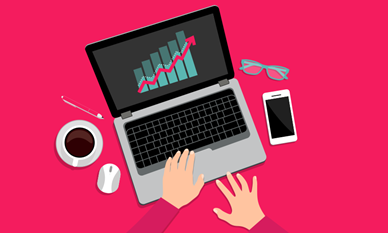Mental wellbeing: It's all about moderation
Published: 01/11/2019
As with physical health, mental health is all about moderation.
But this is so subjective. Helping employees – especially the younger generation – improve self-awareness is key to understanding personal limits & encouraging use of the right tools at the right time, says Dr Keith Klintworth, Managing Director, VitalityHealth.You wouldn’t enter a regime of 100% junk food and 0% exercise and expect to get fit. Neither would you live off cabbage soup and spend hours at the gym every day if you wanted to ensure a strong heart and body. When it comes to physical health, it’s all about finding a balance between two extremes: deprivation and over-indulging. And it’s as relevant to diet and exercise as it is to mental wellbeing.
In fact, there’s now a proven correlation between lifestyle choice extremes and mental ill health.
However, getting the balance right relies on moderation: the act of tempering an extreme. And therein lies the problem. Moderation means very different things to different people.
Tipping points
Mental health problems are worse where people do too much or too little exercise. Accordingly, those with the highest and lowest Body Mass Index (BMI) are more likely to have mental health issues. This represents just one of the findings from Vitality’s annual Britain’s Healthiest Workplace (BHW) study1.Mirroring this are the physical activity levels of those with depression. The majority (9.9%) don’t do any exercise at all, while the minority (2.6%) do between 9 – 10 hours’ exercise a week, according to BHW data. It seems that 10 hours a week is the tipping point though. Anything over that and we see a sharp rise in the percentage of people with depression: at 6.7%, this represents the second highest percentage behind zero exercise.
The younger generation are erring towards the farthest ends of this spectrum. Employees below the age of 25 were found to have 3.5 times more incidences of depression at 13.3% – the highest of all age groups surveyed by BHW – in comparison to over 55’s at just 3.8%.
At the same time, Millennials represent the most overweight generation since current records began, according to estimates by Cancer Research UK2.
Nice to know you
Psychologist Fiona Murden, speaking as part of Vitality@Work3 podcast, commented that helping individuals improve their self-awareness is key to moderation.“Individuals are often lacking self-awareness these days. Technology is creating more individualism. This leads to a lack of deep and meaningful connections: friends speak to friends via social media more than they do face to face. Factors in our environment are also pressing us more and more. There’s a breakdown of community – people are much more isolated and not asking for guidance and assistance. Plus, there’s a decline in religion or, moreover, what comes with that. In other words, a sense of meaning and purpose – this is vital for mental wellbeing.”
The silent disrupter
This lack of self-awareness obviously isn’t any good for individuals, for society, or for workplace productivity. Poor mental wellbeing is proven to lead to lower engagement at work, a weakened sense of identity with the employer and poorer work performance.Mental health – across all demographics – was found by BHW to be a significant driver of productivity loss last year, accounting for £38bn of the total cost to businesses. Of this, £17.2bn stems specifically from workplace stress – an issue that is more often than not left undiagnosed. However, it’s a driver that businesses can address through various interventions and initiatives.
For instance, 83% of people who use one-on-one coaching to support mental health and wellbeing found it impactful and 78% said the same for Cognitive Behavioural Therapy (CBT). 83% of employees who used massage or relaxation classes also said it had a positive impact on their mental health at work.
Horses and water…
That said, engagement with all of this is still way too low.BHW also found that, for example, that while 67% of employees have access to interventions in the mental health space, only 26% of them claim to have knowledge and awareness of the interventions on offer. Additionally, once aware, only 18% of employees actually participate in any of the programmes, demonstrating that not only do employers need to increase awareness, but employees need to engage with the interventions available to maximise impact.
The fact is, companies can throw every tool in their armoury at this problem – from Employee Assistance Programmes and mental health first aid training to mindfulness apps and lunchtime walk and talk sessions – but unless employees are supported to get better acquainted with themselves, their individual needs and how and when to ask for help, they’ll never use them.
That age-old proverb springs to mind: you can lead a horse to water, but you can’t make it drink.
Murden adds: “As individuals we need to understand our tipping points. It’s about knowing what’s your comfort zone, what’s your stretch zone – the area you need to get to in order to perform at your peak – and what’s your panic zone. If an athlete spends too long in their panic zone, they’ll tear a ligament or break something. It’s the same for mental health.
“It all comes down to self-awareness: knowing where your weak spots are and where you’ll need help. You can learn about yourself by using anything from tracking apps or an Apple watch to a simple notepad: logging things like your sleep and why you felt down at any point in the day.
“If we improve employees’ self-awareness and give them the tools for psychological development, they will perform better as they’ll understand where their weak spots are and where they need help.
“It’s about self-managing our emotions, understanding who we are as people and finding that sense of purpose.”
Sources:
1 Britain’s Healthiest Workplace, Vitality in partnership with RAND Europe and the University of Cambridge, April 2019 https://www.vitality.co.uk/business/healthiest-workplace/
2 Millennials top obesity chart before reaching middle age, Cancer Research UK, Feb 2018 https://www.cancerresearchuk.org/about-us/cancer-news/press-release/2018-02-26-millennials-top-obesity-chart-before-reaching-middle-age
3 The Mindful Workplace, Vitality@Work, Nov 2018 https://www.vitality.co.uk/business/at-work/core-services/podcast-series/
Where to next?
-
A nurse's tips to beat lockdown lows
Vitality Head of Clinician Management, Claire O’Neill offers top tips for keeping positive during this time.
-
The must-have employment benefits post COVID-19
Our latest data shows that we’re more at risk of anxiety and stress than pre-lockdown, it’s so much more important for your clients’ businesses to focus on wellbeing at work.
-
Insights Hub
Our Insights Hub brings you our range of adviser content - from video series to articles & blogs.


